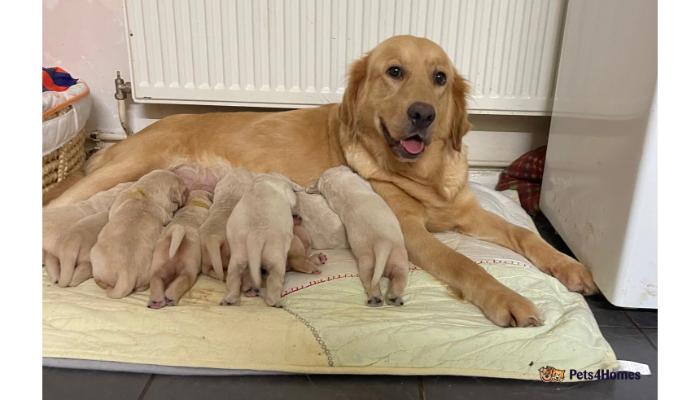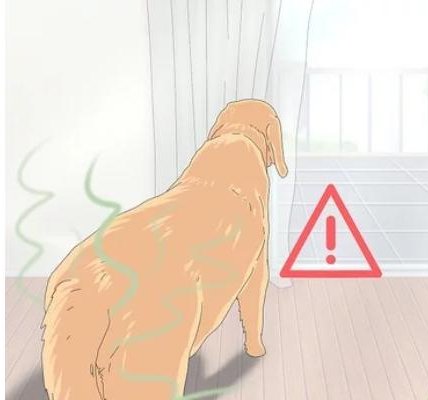You’ve prepared for the miracle of birth, but now it’s crucial to spot the warning signs post-delivery. When your dog’s bleeding doesn’t stop, when she ignores her pups, or when the little ones aren’t thriving, you’re right to be concerned.
Keep an eye out for the painful swell of mastitis or her continued discomfort—these are red flags.
Your vigilance and quick action can ensure the health and well-being of both the mother and her newborn puppies.
Recognizing Excessive Postpartum Bleeding in Dogs:

Monitor your dog closely for excessive postpartum bleeding, which can be a critical sign of complications after giving birth. It’s essential to differentiate between normal discharge and hemorrhage that requires control. A small amount of bleeding is typical, but a steady flow or large clots indicate a problem.
Blood clotting disorders may manifest during this vulnerable time, complicating your dog’s ability to heal.
If you notice an abnormal amount of blood, it’s urgent to seek veterinary care immediately. Your vet can assess for hemorrhage control methods and investigate underlying blood clotting disorders. Don’t wait; prompt attention can be lifesaving.
You’re doing the right thing by being vigilant and proactive about your dog’s health during her postpartum period.
Maternal Behavior Concerns in Dogs:
While you’re ensuring your dog’s physical health postpartum, it’s also crucial to observe if she’s displaying any signs of neglectful maternal behavior towards her puppies. Neglect can manifest as a lack of grooming, failing to nurse, or even abandoning the litter. If she’s not attending to their cries or keeping them warm, these are red flags.
Maternal aggression, though sometimes a protective instinct, can become problematic if directed towards the puppies. Additionally, appetite loss in the mother can signal underlying health issues, which may affect her ability to care for her young. It’s important to understand that these behaviors can stem from stress, discomfort, or illness.
Promptly consulting your veterinarian can help address any medical issues and support your dog in her new role as a mother.
Abnormal Puppy Growth and Development:
You should be concerned if any of the puppies show signs of abnormal development, such as difficulty feeding, lethargy, or stunted growth. Puppy lethargy can be particularly alarming; it often indicates that the puppy isn’t receiving the necessary nutrients or is struggling with an underlying health issue.
Developmental delays, on the other hand, can manifest as milestones not being met, such as opening their eyes or ears later than expected or having trouble standing and walking as they age.
As a responsible pet owner, it’s essential to monitor these signs closely and consult with a veterinarian promptly. Early detection and intervention can be crucial for the puppies’ health. Your vet can provide guidance and treatment options to help manage any developmental concerns and ensure the best possible outcome for the litter.
Signs of Canine Mastitis:
If your dog’s breasts become swollen, painful, or hot to the touch after giving birth, she may be suffering from canine mastitis, a potentially serious infection. This condition can hinder milk production issues, making it difficult for her to nurse her puppies. Keep an eye out for these inflammation indicators:
- Redness and warmth in the mammary glands
- Discharge that’s abnormal, such as pus or blood-tinged milk
- Unusual hardness or lumps in the breast tissue
- Reluctance to nurse due to discomfort or pain
- General signs of illness, like fever or lethargy
It’s crucial to seek veterinary care promptly if you observe any of these symptoms. Early intervention can prevent complications and ensure both your dog and her puppies remain healthy.
Signs of Persistent Whelping Discomfort in Dogs:

Monitor your dog closely for ongoing signs of distress, such as persistent whelping discomfort, which could indicate complications post-delivery. It’s not uncommon for a dog to experience whelping exhaustion after giving birth, but this should gradually subside. If you notice that your dog remains unusually lethargic, restless, or appears to be in pain, it’s crucial to take action. Effective pain management can make a significant difference in her recovery.
Observe if she’s attentive to her puppies or neglecting them, another potential red flag. Discomfort that doesn’t ease or worsens can be a sign of infection, retained placentas, or other health issues that require immediate veterinary attention.
Frequently Asked Questions:
You’ll notice your dog resuming normal activities gradually. The recovery timeline typically spans a few weeks, considering exercise limitations. It’s crucial to monitor her progress and provide a comfortable environment for healing.
Yes, dietary changes can impact newborn puppies’ health postpartum. You should ensure dietary supplements address any nutrient deficiencies to support both the mother’s recovery and the puppies’ growth and development.
Imagine you’re a new mom, feeling protective. It’s normal for a mother dog to show maternal aggression or nesting behavior, but if she’s overly anxious, it could be a sign of underlying issues.
You should follow a strict vaccine schedule and deworming protocol for your puppies, starting a few weeks after birth to ensure they’re protected against common diseases and parasites.
If you suspect a puppy isn’t getting enough milk, check for dehydration and monitor their weight closely. Offer supplemental feeding if necessary and consult a vet for the best course of action.
Conclusion:
In sum, after your dog has given birth, keep a vigilant eye for troubling signs.
Excessive bleeding, disinterest in puppies, abnormal growth, mastitis, or ongoing discomfort aren’t just bumps in the road—they’re red flags demanding immediate vet attention.
Your dog’s health is paramount, and catching issues early can make all the difference.
Remember, an ounce of prevention is worth a pound of cure, so don’t hesitate to seek professional help if you suspect something’s amiss.

Hey there, I’m Janet Brooks, a dog-loving student from California. I’m all about helping pups in need, especially those without homes. Me and my awesome friends work together to give shelter and love to stray dogs. Oh, and I also write blogs about dogs to share helpful info.